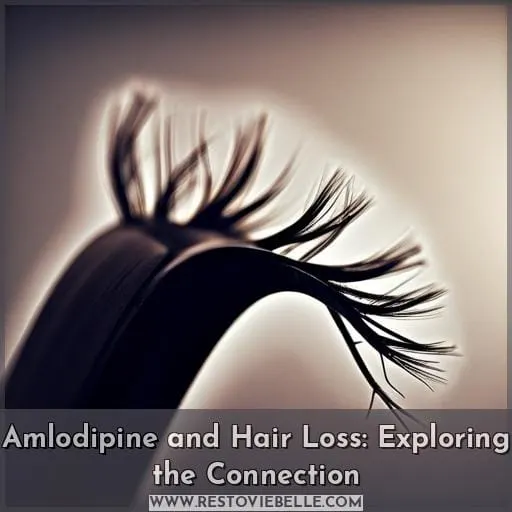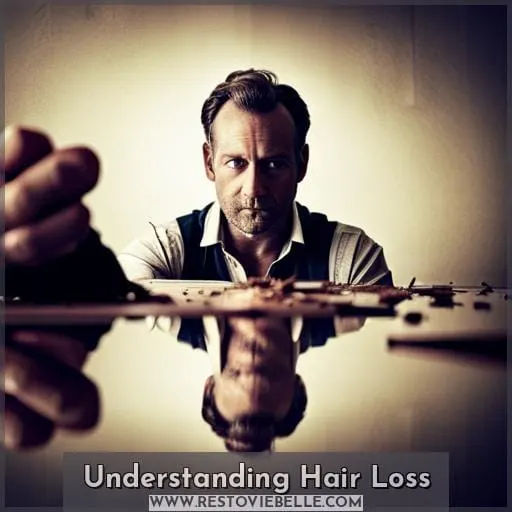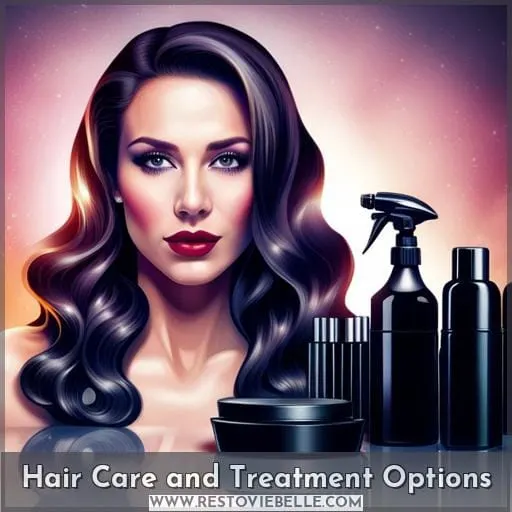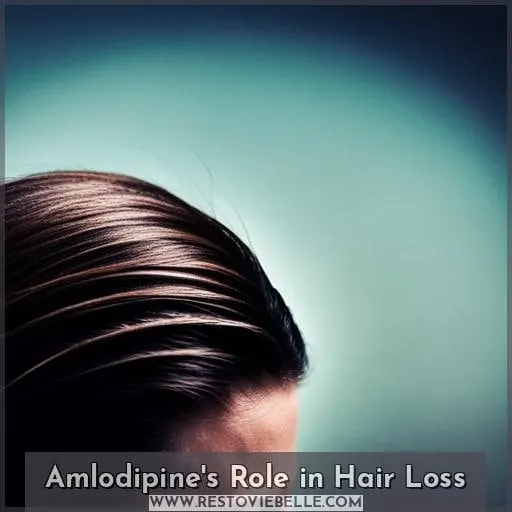This site is supported by our readers. We may earn a commission, at no cost to you, if you purchase through links.
 Have you ever been prescribed Amlodipine for high blood pressure, coronary artery disease, or chest pain? Then it’s likely that you may have wondered: Does amlodipine cause hair loss? Many people take this medication to treat their health issues but are concerned about the potential side effects that could come with it.
Have you ever been prescribed Amlodipine for high blood pressure, coronary artery disease, or chest pain? Then it’s likely that you may have wondered: Does amlodipine cause hair loss? Many people take this medication to treat their health issues but are concerned about the potential side effects that could come with it.
In this article, we will be exploring the connection between amlodipine and hair loss – delving into what causes it, how to cope, and any treatment options available.
Table Of Contents
- Key Takeaways
- Amlodipine and Hair Loss: Exploring the Connection
- Understanding Hair Loss
- Amlodipine Overview
- Hair Care and Treatment Options
- Coping and Seeking Help
- Amlodipine’s Role in Hair Loss
- Treatment Options for Hair Loss
- Seeking Professional Advice
- Frequently Asked Questions (FAQs)
- Is hair loss from amlodipine reversible?
- Can amlodipine be used to prevent hair loss?
- Does amlodipine cause permanent hair loss?
- Are there any known interactions between amlodipine and other medications that can cause hair loss?
- Are there any lifestyle changes that can reduce the risk of hair loss associated with amlodipine?
- Conclusion
Key Takeaways
- Amlodipine is a calcium channel blocker used for cardiovascular conditions.
- Hair loss concerns are common among those taking amlodipine.
- No evidence links amlodipine to hair loss or thinning.
- Lifestyle changes, supplements like biotin and vitamin D may help prevent hair loss.
Amlodipine and Hair Loss: Exploring the Connection
You may have heard that some medications can disrupt the hair growth cycle, leading to potential hair loss. Exploring amlodipine’s role in this connection is important. Amlodipine is a calcium channel blocker commonly used to treat cardiovascular conditions.
It has side effects such as dizziness, headache, and edema, but it does not appear to be linked with any type of hair loss.
The normal human scalp experiences three different stages: anagen (active growth), catagen (transitional stage), and telogen (resting phase). DHT levels are known to affect these phases in terms of how much new hairs grow or shed from the follicles.
When stopping medication like amlodipine, you should look for underlying causes such as hereditary factors or nutrition deficiency before seeking help from a medical professional about your hair shedding concerns.
Proper lifestyle changes, including stress reduction techniques and regular scalp massage, can also contribute positively towards healthy locks. Additionally, supplements containing biotin and vitamin D support strong roots while nourishing strands against breakage and thinning due to the aging process.
Advanced treatments include topical finasteride solutions, minoxidil solution, along with surgical options such as FUT (follicular unit transplantation) or FUE (follicular unit extraction). Finally, if experiencing sudden or severe hair loss, seek guidance immediately since there might be other medical issues contributing apart from genetics and age-related factors.
Understanding Hair Loss
Understanding hair loss can be a complex process, as it is often caused by genetics and aging, medications that disrupt the natural growth cycle of the hair, telogen effluvium due to stress or other lifestyle factors.
It is important to understand what may cause your own individual hair loss in order to find an effective treatment plan.
Genetics & Aging
You’re likely aware of how genetics and aging can affect hair loss, so it’s important to investigate them both. Factors such as hereditary predisposition, environmental factors, emotional stress, and underlying medical conditions can all contribute to a change in scalp health and subsequent hair loss.
Genetic factors are largely out of our control, but lifestyle choices like diet or the use of certain medications may influence hair growth too.
To boost scalp health, you could opt for dietary supplements such as biotin or vitamin D3, which have been linked with improved hair growth results. Finally, keep an eye on any underlying conditions that might be causing your issues – if necessary, seek professional help for further advice regarding your individual situation.
Medications & Hair Loss
Certain medications can disrupt the hair growth cycle, leading to temporary or permanent hair loss. Genetic factors, medical conditions, and lifestyle choices are all potential contributors to this condition.
Popular topical treatments include minoxidil (Rogaine), saw palmetto shampoo, and biotin supplements. Stress management techniques may also be beneficial in restoring healthy hair growth. Propranolol is an example of a drug that has been linked with temporary shedding, while amlodipine does not appear connected with any form of balding or thinning – though seeking professional advice is always recommended if experiencing sudden or severe cases of hair loss.
Telogen Effluvium
Telogen effluvium is a disruption to the hair growth cycle that can turn your mane from lush to lank in no time. This condition, triggered by medication or stress, results in an increase in hair shedding due to DHT levels and other factors that disrupt the anagen-catagen-telogen stages.
Lifestyle & Hair Loss
It’s important to consider how lifestyle choices like stress, nutrition, smoking, and alcohol can influence hair loss. To prevent this problem, it is recommended to make changes such as managing stress levels, modifying diet, making permanent lifestyle changes, establishing regular exercise habits, and improving sleep hygiene.
High blood pressure medications, such as amlodipine, may also cause temporary hair loss due to disruption of the anagen or telogen phase of the hair growth cycle. For severe cases, a professional may suggest a more advanced treatment option, including a potential transplant or other medical procedure.
Hair health should not be taken lightly – take steps now before any serious damage occurs!
Amlodipine Overview
Greeting! Amlodipine is a calcium channel blocker commonly used to treat cardiovascular conditions. It has been known to have side effects such as dizziness, headache, and edema in some patients. Additionally, its impact on the hair growth cycle and DHT levels can cause hair loss in rare cases.
Therefore, it’s important to understand the implications of taking this medication before beginning treatment with amlodipine.
Mechanism
You can’t ignore the fact that amlodipine has a powerful mechanism, almost like an unstoppable force of nature! It’s a calcium channel blocker used to treat high blood pressure and chest pain by relaxing narrowed or constricted blood vessels.
This drug also affects DHT levels in the scalp, which may cause telogen effluvium hair loss. Scalp reduction and massage, alongside supplements such as biotin or vitamin D, can help counter any effects from amlodipine vs lisinopril use.
Seek professional guidance for more severe cases of hair loss due to this drug treatment before opting for surgery options such as FUT/FUE procedures.
Side Effects
Common side effects of amlodipine include dizziness, headaches, and edema. Stress levels, dietary habits, and environmental factors can also affect hair growth, as well as dandruff or psoriasis. Weight gain or an allergic reaction to the medication could be other possible side effects from taking amlodipine, which should also be monitored alongside any interactions with alcohol.
Medication side effects are common, so it is important to talk to a doctor if hair loss appears after starting treatment with Amlodipine in order for appropriate advice and care to be given accordingly.
Hair Growth Cycle
Understanding the hair growth cycle is key to determining if amlodipine could be a potential factor in your hair loss.
Hair care routine, including shampoo, conditioner, and avoiding heat tools, can help prevent further shedding.
Supplements with biotin and vitamin D also assist with hair shedding, while scalp massage offers additional benefits for healthy growth.
Calcium channel blockers like amlodipine differ from beta blockers, such as propranolol, which may cause telogen effluvium or temporary thinning of the hairs due to disruption of their natural growth cycles.
Properly understanding how medications interact with our bodies is essential for managing any associated risks and fostering better overall health outcomes.
DHT & Hair Loss
DHT levels in the scalp can be impacted by amlodipine, so it’s important to consider that when managing hair loss. DHT blocking may reduce shedding and help maintain hormone level balance for optimal scalp health.
Drug interactions with coronary artery disease treatments like ACE inhibitors should also be taken into account when exploring alternative treatments or prevention strategies for hair loss.
Making lifestyle changes, such as reducing stress, eating a balanced diet, and avoiding smoking or alcohol, is another way to prevent further thinning of the hair caused by amlodipine use.
Taking proactive measures now can keep your locks looking healthy later on!
Hair Care and Treatment Options
Taking proper care of your hair is important for maintaining healthy growth. There are a variety of treatments available, from supplements and massages to advanced medications and surgical options. It’s essential to understand the pros and cons of each option before making a decision about which one best suits you.
Proper Hair Care Routine
Having a proper hair care routine is essential for minimizing hair shedding and maximizing healthy growth. This includes using shampoo and conditioner, avoiding heat tools like irons and curlers, as well as scalp massage with oil to promote blood circulation.
Taking biotin supplements or increasing intake through food can also help prevent hair loss. Advanced treatments such as minoxidil solution, finasteride tablets, or surgery options like FUT (follicular unit transplantation) and FUE (follicular unit extraction) are available for severe cases of balding.
Seeking professional guidance on coping strategies, including stress reduction techniques, may also be beneficial when it comes to tackling the issue of amlodipine vs losartan-related hair loss.
Supplements & Massage
Supplements and massage can help you supplement your scalp health, stimulating the strands for strong growth. Dietary sources of biotin, vitamin D, and other essential nutrients are beneficial for hair loss sufferers.
Scalp massages increase circulation to encourage healthy hair growth and reduce tension-related problems like traction alopecia. Stress management techniques may also be used in conjunction with treatments such as minoxidil or finasteride solutions, or more advanced options like hair transplants if necessary.
Severe chest pain, leg swelling, or difficulty breathing should not be overlooked when taking any form of medication – including amlodipine – even at a reduced dose recommendation for seniors.
Advanced Treatments
If you’re struggling with hair loss, advanced treatments like minoxidil and finasteride may be an option. Hair transplants, reduction of DHT levels through stress relief, and vitamin D supplementation are all viable options.
Consider balding patterns in Canada where amlodipine use is banned for its potential to cause hair loss; consult a medical professional before taking any medication or undergoing treatment.
Surgical Options
For more severe cases of hair loss, surgical options such as FUT, FUE, and scalp reduction can be considered.
| Procedure | Description |
|---|---|
| Scalp Reduction | Removal of balding area skin to reduce DHT levels |
Hair Transplantation
FUE │ Harvesting individual follicles from donor areas for transplantation in thinning areas. Telogen Effluvium: Temporary shedding due to disruption in the hair growth cycle caused by a change or shock to the body like medication use or sudden stress. Vitamin D helps maintain healthy levels of telogen effluvium, so supplement intake may help manage this type of temporary shedding while exploring medical advice and other treatment options.
Coping and Seeking Help
As someone who may be experiencing hair loss while taking amlodipine, you should consider the various coping strategies, professional help options, and underlying conditions that could be causing this problem.
Seeking advice from a doctor and exploring treatment options can help you manage your hair loss in an effective way.
Coping Strategies
Coping with hair loss can be a challenge, but seeking professional advice and implementing healthy lifestyle changes can help you find ways to manage it.
Stress reduction techniques, such as yoga or meditation, may prove beneficial. FDA-approved treatments like minoxidil (Rogaine) could offer relief.
Supplements containing biotin and vitamin D are also recommended for their potential to reduce hair shedding and support the scalp’s natural DHT levels.
While exploring treatment options, don’t forget to consider any underlying medical issues that may be contributing to your thinning hair.
With proper guidance from a doctor or specialist, you’ll have access to strategies tailored specifically for your situation. Empowering yourself with knowledge will go a long way towards managing any feelings of distress during this process.
Professional Help
Seek professional help if you’re experiencing sudden or severe hair loss. Diagnosis is of utmost importance because it can provide insight into underlying medical conditions that may be causing the issue.
Seeking advice from a medical professional can also ensure proper care and treatment plans are being followed based on patient history and lifestyle habits.
Professional guidance is critical in these cases to determine what treatments may work best for each individual’s needs. This could include medications, supplements, scalp massage techniques, or other non-invasive approaches such as topical finasteride and minoxidil solutions.
The key to managing hair loss effectively lies in understanding its causes – something only a healthcare provider can do – so never hesitate when seeking out specialized advice!
Underlying Conditions
Unexpected hair loss can be a sign of an underlying medical condition, so it’s important to investigate any causes that may be present. Your medical history, lifestyle changes, and hormonal imbalances should all be considered when looking for the cause.
Consider your nutrition intake and if you’re under psychological stress too, as these could also play a role in sudden thinning or balding patches.
If you suspect amlodipine is causing your hair loss, then speak with your doctor about alternative medication options or other treatments available that could help reduce further shedding, like minoxidil (Rogaine) shampoo or biotin supplements.
Don’t put up with unwanted hair loss without exploring potential solutions first – seek professional advice today!
Amlodipine’s Role in Hair Loss
Though there is not much evidence to support the notion that amlodipine causes hair loss, it still remains a misconception among many. Additionally, while propranolol can cause temporary hair loss due to disrupted growth cycles, research shows that amlodipine does not have an impact on scalp DHT levels and therefore has no direct effect on hair growth.
Evidence
Discover the evidence about whether amlodipine is linked to hair loss and how it could be impacting your scalp. Research suggests no direct link between this drug and hair shedding, but there are certain risks that can affect your scalp health.
Drug interactions with other medications in combination with amlodipine may cause temporary thinning or disruption of the normal hair growth cycle.
Learn more about potential causes, so you can make an informed decision about protecting your locks from further damage and promoting healthy follicles for strong regrowth.
Take action today to understand the risks associated with taking amlodipine, as well as how to best support natural hair growth!
No Support
Despite the lack of evidence, there is a misperception that amlodipine could be responsible for hair loss. Before jumping to such conclusions, it’s important to take into account sensitive scalp, environmental factors, dietary changes, and medication adjustments as possible causes.
Mental health should also not be overlooked as distress can greatly impact your body in many ways. A doctor should evaluate any sudden or severe hair loss and provide guidance on how best to address it through lifestyle modifications or proper medical treatment if necessary.
Don’t let false assumptions cloud judgment. Look at all possibilities before coming up with solutions for managing potential hair loss issues.
Misconception
Although there is no evidence that amlodipine can cause hair loss, many people mistakenly believe it does. This hypothesis stems from the fact that other blood pressure medications do carry a risk of temporary hair loss.
However, research studies have shown this to be unrelated to amlodipine use. Factors such as genetics and lifestyle changes are known risk factors in developing certain types of hair loss. However, potential treatments for those affected by these conditions may not necessarily apply when taking amlodipine.
It’s important to understand the causes and seek professional guidance before trying any type of treatment or making drastic lifestyle changes while on medication like amlodipine.
Amlodipine Vs. Propranolol
Comparing amlodipine to propranolol, you’ll find that their impacts on hair growth differ significantly. In terms of inflammatory response, hormonal changes, and patient experience, while the former does not affect it at all, the latter can lead to temporary hair loss.
Additionally, drug interactions and lifestyle factors may influence either’s impact – so consult a doctor for advice! Overall, amlodipine has no effect on your hair’s cycle while propranolol is linked with temporary disruption in some cases.
Treatment Options for Hair Loss
If you are experiencing hair loss, there are a variety of treatments available that can help. These include Minoxidil (Rogaine), specialized shampoos for hair loss, biotin supplements, and other treatments such as topical finasteride and minoxidil solutions.
Vitamin D and Biotin have also been linked to aiding in the reduction of shedding. It is important to consult with a medical professional who can provide guidance on which treatment may be best suited for your individual situation.
Minoxidil (Rogaine)
You can try Minoxidil (Rogaine), an FDA-approved topical treatment, to help drastically reduce hair shedding. It works by stimulating the scalp and encouraging new hair growth around dormant follicles.
Not only that, but it also helps with stress reduction and lifestyle choices like shampooing regularly or using a scalp massage for additional benefits. A proper care routine is essential when dealing with any type of hair loss, so be sure to investigate all your options before making any decisions about treatments such as minoxidil or even potentially considering a transplantation option if necessary.
Hair Loss Shampoos
Try a hair loss shampoo containing saw palmetto to help reduce shedding. Scalp health can be improved, and with the right ingredients, new treatments may even stimulate hair growth and improve texture.
Consider all available treatment options for your individual needs – from traditional methods to cutting-edge solutions – for the best results in maintaining healthy locks.
Biotin
Biotin is sometimes found in hair loss shampoos and supplements to help reduce shedding. It has many health benefits, including aiding in hair growth and preventing vitamin deficiency side effects.
Supplements With Biotin and Vitamin D
Supplements containing biotin and vitamin D may help reduce hair shedding when taken as part of your daily routine. Their efficacy is linked to improved scalp health, follicle stimulation, and the prevention of vitamin deficiencies, which can contribute to hair loss or regrowth issues.
| Table: | Supplement | Efficacy | Hair Regrowth |
|---|---|---|---|
| Biotin | Good | Yes | |
| Vitamin D | Excellent | Yes |
Other Treatments
If you’re looking for an alternative solution to hair loss, consider exploring other treatments such as topical finasteride and minoxidil solutions. These could potentially aid in reducing DHT levels, promoting healthy hair shedding with scalp massage, and helping restore vitamin D levels.
Another potential option is the use of oral or topical finasteride – a drug thought to reduce further balding by blocking certain hormones that may contribute to hair thinning.
Seeking Professional Advice
Are you concerned about hair loss while taking amlodipine? It is important to consult a doctor and research information sources to understand the potential causes of hair loss. Seeking professional advice can help you determine if there are underlying medical conditions or medication side effects contributing to your thinning locks.
Consult a Doctor
You should always consult a doctor if you’re experiencing any hair loss while taking amlodipine. Medication interactions, scalp health, lifestyle changes, and hair growth can all be factors that affect the outcome of your treatment.
Your doctor will be able to assess what is causing the issue and provide medical advice for how best to address it. They may suggest changes in medication or lifestyle choices, such as diet, stress management techniques, or exercise routines, to help improve scalp health and promote healthy regrowth of your locks.
If necessary, they can also investigate further treatments like minoxidil (Rogaine), finasteride, or even surgical options if the results don’t come from more simple interventions alone.
Don’t wait until things get worse; seek professional guidance early on for optimal outcomes when dealing with sudden or severe hair loss issues related to amlodipine use – it could make all the difference!
Information Sources
Research medical associations and peer-reviewed studies to explore treatment options for hair loss. To gain more insight into the possible connection between amlodipine and hair loss, look into research papers that specifically focus on this topic.
It’s important to get professional medical advice if you’re concerned about any medications or lifestyle factors affecting your health.
Additionally, online forums can provide valuable information regarding disease links and insights from those with similar experiences taking medication for hypertension. However, it’s best practice to consult a doctor before making any changes in diet or exercise habits, as well as starting new supplements, due to potential drug interactions or adverse effects of high dosages of vitamins/minerals on certain individuals.
Gather all the facts before deciding how best to proceed in order to create an informed decision tailored towards individual needs, rather than relying solely on anecdotal evidence found online.
Frequently Asked Questions (FAQs)
Is hair loss from amlodipine reversible?
Hair loss from amlodipine may be reversible with proper treatment. While evidence suggests that the condition is not a common side effect, seeking professional advice can help identify underlying causes and explore possible treatments such as minoxidil and biotin supplements, aiming to restore your hair’s growth cycle.
Can amlodipine be used to prevent hair loss?
You may have heard of amlodipine, but did you know it can be used to prevent hair loss? Studies show this common medication is not linked to any form of hair thinning or shedding. In fact, many people use it as part of their regular hair care routine! There’s no need for drastic measures; simply adding amlodipine to your regimen could give you back the fullness and strength you desire.
Does amlodipine cause permanent hair loss?
No, there is no evidence that amlodipine causes permanent hair loss. Studies suggest it does not disrupt the growth cycle of your hair and therefore should not lead to any long-term issues. However, if you are experiencing sudden or severe hair loss while taking amlodipine, it’s best to consult a medical professional for advice.
Are there any known interactions between amlodipine and other medications that can cause hair loss?
Studies indicate that amlodipine has been linked to hair loss, although it is not a documented side effect. It is possible that interactions with other medications could cause temporary hair loss, so it is advisable to consult your doctor if you experience this while taking amlodipine.
Are there any lifestyle changes that can reduce the risk of hair loss associated with amlodipine?
Studies show that up to 70% of people taking amlodipine can experience hair loss. To reduce the risk, it’s important to maintain a healthy lifestyle – eat nutritious foods, limit stress and alcohol intake, avoid using heat styling tools, and regularly massage your scalp.
Supplements such as biotin and vitamin D may also help. Speak with your doctor for more advice on managing hair loss due to amlodipine use.
Conclusion
It can be difficult to manage hair loss, especially when it arises unexpectedly. If you’re taking amlodipine and experiencing hair loss, it’s important to consult a medical professional for advice and guidance.
Despite some misconceptions, evidence does not support amlodipine as a cause of hair loss. However, other blood pressure medications, such as propranolol, can result in temporary telogen effluvium.
While there is no definitive cure for hair loss, there are many treatments available.
Furthermore, maintaining a healthy lifestyle and proper hair care routine, as well as taking biotin and vitamin D supplements and receiving scalp massages, may help slow hair loss and promote hair growth.
Most importantly, seek professional help to determine the underlying cause of your hair loss and discuss possible treatment options.














